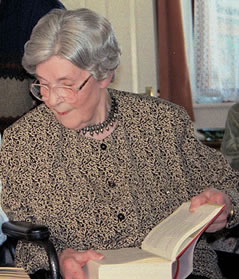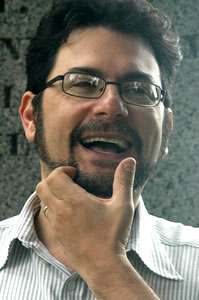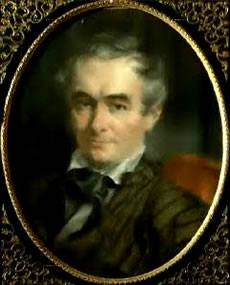|
De Engelse schrijfster Ellis Peters werd op 29 september 1913 als Edith Pargeter geboren in Horsehay. Zie ook mijn blog van 28 september 2009 en ook mijn blog van 28 september 2010.xml:namespace prefix = o ns = "urn:schemas-microsoft-com:office:office" />
Uit: The Confession of Brother Haluin
December came in with heavy skies and dark, brief days that sagged upon the rooftrees and lay like oppressive hands upon the heart. In the scriptorium there was barely light enough at noon to form the letters, and the colors could not be used with any certainty, since the unrelenting and untimely dusk sapped all their brightness.
The weather-wise had predicted heavy snows, and in midmonth they came, not with blizzard winds, but in a blinding, silent fall that continued for several days and nights, smoothing out every undulation, blanching all color out of the world, burying the sheep in the hills and the hovels in the valleys, smothering all sound, climbing every wall, turning roofs into ranges of white, impassable mountains, and the very air between earth and sky into an opaque, drifting whirlpool of flakes large as lilies. When the fall finally ceased, and the heavy swags of cloud lifted, the Foregate lay half buried, so nearly smoothed out into one white level that there were scarcely any shadows except where the tall buildings of the abbey soared out of the pure pallor, and the eerie, reflected light made day even of night, where only a week before the ominous gloom had made night of day.

Ellis Peters (28 september 1913 14 oktober 1995)
De Amerikaanse schrijver en uitgever Ben Greenman werd geboren op 28 september 1969 in Chicago. Zie ook mijn blog van 28 september 2008 en ook mijn blog van 28 september 2009 en ook mijn blog van 28 september 2010.
Uit: Chekhov Meets Paris Hilton
My new book, Celebrity Chekhov, is an homage and a travesty. Even calling it "my new book" is oddly inaccurate; it's a project that I directed more than I wrote. In the book, I redeploy almost two dozen of the short stories of the Russian master Anton Chekhov, replacing his characters with contemporary American celebrities, from Britney Spears to Lindsay Lohan, from Jay-Z to Larry King. At times, theres a method to the madness, and the celebrities slot nicely into Chekhovs plots; a story about a young man who is excited to find his name in the newspaper for public drunkenness is reupholstered as a story about Kim Kardashian and her famed sex tape. Other times, theres a madness to the method: is The Man in the Case, a sublime story of psychological limitations, really, at any level at all, clarified or enriched by the inclusion of Jon Lovitz?
The project had its unholy birth a few years ago, when I was talking to a friend about canonical authors and their most famous characters. I brought up Chekhov. She narrowed her eyes. There are famous characters in the plays, sure, she said. The stories, not so much.
I asked around, and most people shared her view. Compared to Shakespeare or Dickens or Hemingway or Bellow, Chekhovs short stories were widely read but remembered more subtly. Part of the reason was the translations, which could be stuffy; the settings tended to hold readers at arm's length. But part of the reason was the characters, or the way that Chekhov uses them: its hard to think of The Lady with the Dog as a story about Anna in quite the same way that Moby-Dick is a story about Ahab or Catcher in the Rye is a story about Holden Caulfield. Many times, it's hard to remember the names of the men and women in the stories are; they're easier to remember by typethe young clerk, the middle-aged dowager. They are filled with character, certainly, but they are not exactly characters.

Ben Greenman (Chicago, 28 september 1969)
De Franse schrijver, historicus en archeoloog Prosper Mérimée werd geboren in Parijs op 28 september 1803. Zie ook mijn blog van 28 september 2006 en ook mijn blog van 28 september 2008 en ook mijn blog van 28 september 2009 en ook mijn blog van 28 september 2010.
Uit: Carmen
J'avais toujours soupçonné les géographes de ne savoir ce qu'ils disent lorsqu'ils placent le champ de bataille de Munda dans le pays des Bastuli-Poeni, près de la moderne Monda, à quelque deux lieues au nord de Marbella. D'après mes propres conjectures sur le texte de l'anonyme, auteur du Bellum Hispaniense, et quelques renseignements recueillis dans l'excellente bibliothèque du duc d'Osuna, je pensais qu'il fallait chercher aux environs de Montilla le lieu mémorable où, pour la dernière fois, César joua quitte ou double contre les champions de la république. Me trouvant en Andalousie au commencement de l'automne de 1830, je fis une assez longue excursion pour éclaircir les doutes qui me restaient encore. Un mémoire que je publierai prochainement ne laissera plus, je l'espère, aucune incertitude dans l'esprit de tous les archéologues de bonne foi. En attendant que ma dissertation résolve enfin le problème géographique qui tient toute l'Europe savante en suspens, je veux vous raconter une petite histoire; elle ne préjuge rien sur l'intéressante question de l'emplacement de Munda.
J'avais loué à Cordoue un guide et deux chevaux, et m'étais mis en campagne avec les Commentaires de César et quelques chemises pour tout bagage. Certain jour, errant dans la partie élevée de la plaine de Cachena, harassé de fatigue, mourant de soif, brûlé par un soleil de plomb, je donnais au diable de bon coeur César et les fils de Pompée, lorsque j'aperçus, assez loin du sentier que je suivais, une petite pelouse verte parsemée de joncs et de roseaux. Cela m'annonçait le voisinage d'une source. En effet, en m'approchant, je vis que la prétendue pelouse était un marécage où se perdait un ruisseau, sortant, comme il semblait, d'une gorge étroite entre deux hauts contreforts de la sierra de Cabra. Je conclus qu'en remontant je trouverais de l'eau plus fraîche, moins de sangsues et de grenouilles, et peut-être un peu d'ombre au milie des rochers. À l'entrée de la gorge, mon cheval hennit, et un autre cheval, que je ne voyais pas, lui répondait aussitôt.

Prosper Mérimée (28 september 1803 23 september 1870)
De Nederlandse schrijver, journalist en columnist Thijs Zonneveld werd geboren op 28 september 1980 in Sassenheim. Zie ook mijn blog van 8 juli 2011 en ook mijn blog van 28 september 2009 en ook mijn blog van 28 september 2010.
Uit: Cancellara is een smeerlap (Column)
Nadat we de VAM-berg (ja, de Ronde van Drenthe heeft bergen) waren gepasseerd, was Cancellara nergens meer te bekennen. Gelost. Ik werd 41e, Cancellara eindigde als zoveelenvijftigste. Later hebben we nooit meer tegen elkaar gereden. Conclusie: Zonneveld Cancellara: 1-0.
Brommershow
Het verhaal wordt met elke overwinning van Cancellara mooier. Ik heb het de afgelopen week minimaal twintig keer verteld. Zondag, toen Cancellara bezig was met een brommershow op weg naar Roubaix, besloot ik de uitslag van De Ronde van Drenthe 2002 op te zoeken om m uit te printen en in te lijsten. Fluitend scrollde ik door de archieven van wielersites. Af en toe keek ik met een schuin oog naar het beeldscherm waarop Cancellara zijn concurrenten belachelijk maakte.
Na een kwartiertje zoeken had ik de uitslag gevonden. Mijn ogen gleden over de namen. Bij de 40e plek stond mijn naam. Daarna zocht ik naar de naam van de brommer. Zoveelenveertig, zoveelenvijftig, zoveelenzestig, zoveelenzeventig: nergens te bekennen. Ik fronste mijn wenkbrauwen. Spitte de lijst nog een keer door. Ook bij het rijtje opgevers stond hij niet. Voor de zekerheid checkte ik de namen die van de renners die vóór me waren geëindigd.
Op plek 29 stokte mijn adem. Fabian Cancellara. Hij was meer dan zeveneneenhalve minuut voor me gefinisht. Ik stond op van mijn stoel. Wees naar mijn computer. Riep: Dat kan niet! Dat kan niet! Hij heeft afgesneden! Hij heeft met de tijd geprutst! Hij speelt vals!
Shock
Daarna ging ik zitten en staarde in shock naar de laatste kilometers van de brommerparade naar Roubaix. Naar de man die me van mijn mooiste verhaal heeft beroofd. Toen Cancellara over de streep reed, stonden de toeschouwers in het Velodrome op de banken. Ik niet. Cancellara is een smeerlap.

Thijs Zonneveld (Sassenheim, 28 september 1980)
Zie voor nog meer schrijvers van de 28e september ook mijn vorige blog van vandaag.
|



